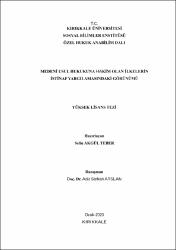Medeni Usul Hukukuna hakim olan ilkelerin istinaf yargılamasındaki görünümü
Özet
5235 sayılı Adli Yargı İlk Derece Mahkemeleri ile Bölge Adliye Mahkemelerinin Kuruluş, Görev ve Yetkileri Hakkında Kanunu'nun 25-48. maddelerinin işlerlik kazanması ile istinaf kanun yolu yeni bir üst mahkeme olarak uygulamada yerini almıştır. İlk derece mahkemelerinde yargılamanın temel yapı taşını oluşturan yargılamaya hakim olan ilkelerin, istinaf kanun yolundaki uygulanma yer ve biçiminin nasıl olacağı bu çalışmada ortaya konmaya çalışılacaktır. Çalışma iki ana bölümden oluşmaktadır. Birinci bölümde, genel olarak istinaf yargılaması incelenmiştir. Bu bölümde istinafın kanun yolları arasındaki yeri, temel özellikleri, amacı, konusu, istinaf başvurusu, başvuru şekli, başvuru hakkına sahip olanlar, ön inceleme, tahkikat, sözlü yargılama ve karar aşamalarından oluşan istinaf safhalarına yer verilmiş, devamında da istinaf incelemesi sonucunda verilebilecek karar çeşitleri üzerinde durulmuştur. İkinci bölümde ise, medeni yargılamaya hakim olan ilkeler kısaca tarif edilerek bu ilkelerin özellikleri ve istinaf yargılamasındaki görünümleri incelenmiştir. Yargılama hukukundaki ilkeler teker teker açıklanmış, her bir ilkenin istinaf yargılamasında ne şekilde uygulanması gerektiği, ilk derece mahkemesindeki uygulamadan ne şekilde farklılık arz ettiği, istinaf yargılamasının sınırları çerçevesinde uygulama biçimleri incelenmiştir. Son olarak ise, istinaf aşamasında medeni yargılamaya hakim ilkelere aykırılık sebepleri ve aykırılık durumunda uygulanacak müeyyideler ile sonuçları ortaya konulmaya çalışılmıştır. Anahtar Kelimeler: İstinaf, Yargılamaya Hakim Olan İlkeler, Bölge Adliye Mahkemesi, Kanun Yolu, Medeni Usul Hukuku With the implementation of Articles 25-43 of the Law on Establishment and Duties of First Instance Courts for Jurisdiction and Regional Courts of Justice, appeal process (a legal remedy) has taken its place in the practice as a new higher court. This study tries to analyse in which way and how the procedural principles, which constitute the main building blocks of proceedings in first instance courts, will be implemented in the appeal process. First off, the main format and essence of appeal process will be explained in our study. In particular, translative, suspensive and corrective effect of appeal process in civil procedure as well as its supervision mechanism will be tried to be conveyed. Procedural principles will be explained together with their importance and prospects and implementation methods of these principles in the appeal process will be tried to be explained. This thesis is comprised of two main chapters. In the first chapter, the overall appeal procedure is analysed. This chapter includes the place of appeal in legal remedies, main characteristics, aim, subject, application for appeal, type of application, those who have the right to apply, and stages of appeal comprising of preliminary review, investigation, oral examination and decision phase, and finally types of decisions that can be rendered in the appellate review are emphasized. In the second chapter, principles in the procedural law are analysed one by one; and under each principle, the manner in which they should be applied in appeal procedure, how they should be different from the application in the first instance court and their way of implementation within the boundaries of appeal procedure are analysed. Finally, the reasons for the violation of the principles prevailing in civil proceedings and sanctions to be applied in case of contradiction were tried to be put forward. Keywords: Appeal, Procedural Principles, Regional Court Of Justice, Legal Remedy, Law Of Civil Procedure
















